|
|
|
Sort Order |
|
|
|
Items / Page
|
|
|
|
|
|
|
| Srl | Item |
| 1 |
ID:
135054
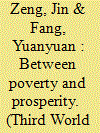

|
|
|
|
|
| Summary/Abstract |
Despite China’s rapid economic growth in the past three decades, Chinese officials and experts are increasingly worried that the country is slowly heading towards the ‘middle-income trap’. The fear is that China might suffer the same stagnation and turbulence as Latin American economies did in the 1980s and 1990s. Will China be able to avoid this trap? Building on the insights of world-systems theory, this paper argues that China’s dependent development, although enabling it to escape the ‘poverty trap’, is likely to bog it down in the ‘middle-income trap’. China’s heavy reliance upon foreign technologies and investment has harmful effects on its economy. Dependent development not only increases China’s economic vulnerability but also truncates domestic industries. To escape the trap, the Chinese state should play a more active role in shifting its growth model away from low-end commodity manufacturing to knowledge-based, high value-added activities.
|
|
|
|
|
|
|
|
|
|
|
|
|
|
|
|
| 2 |
ID:
135071


|
|
|
|
|
| Summary/Abstract |
Over the last 30 years, China has experienced tremendous growth, with many commentators attributing the rapid development to the ‘China Model’ (CM) or the ‘Beijing Consensus’ (BC). However, in recent years growth has slowed and an ever-increasing number of bears are predicting a financial crisis, economic collapse, and a very hard landing, perhaps even a lost decade a la Japan. All of this has led to heated debate about whether the CM is now exhausted, whether China is caught in ‘the middle-income trap’ (MIT) and whether a new model is needed for the next phase of development where China attempts the difficult transition from middle-income country to high-income country status. This article addresses the following five sets of issues. First, is there a CM or BC? If so, what does it entail, and does it differ from the model followed by other successful countries in East Asia? Second, is there a MIT? Is China stuck in the MIT or perhaps multiple MITs? Third, what adjustments to the economic model are required for China to continue its long march toward becoming a high-income country? Fourth, are political, legal and social reforms also required? If so, will all reforms proceed simultaneously or are reforms likely to be sequenced, with adjustments to the economy preceding reforms in other areas? Fifth, is there now a global convergence on a new model of development for developing countries – a Post-Washington, Post-Beijing Consensus?
|
|
|
|
|
|
|
|
|
|
|
|
|
|
|
|
| 3 |
ID:
171974
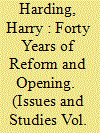

|
|
|
| 4 |
ID:
157886
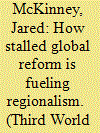

|
|
|
|
|
| Summary/Abstract |
In the Chinese view, the architecture of contemporary global governance – especially that of the Bretton Woods institutions – is flawed and in need of reform. Developing nations (like China), the argument runs, need to be given a role proportionate to their global economic influence. Since the Group of Twenty (G20) became a leaders’ summit in 2008, China has used the forum to push for such reform. But today, despite some supposed progress, reform has stalled. Recognising this fact, China is increasingly emphasising regional integration in its strategy for overcoming the middle-income trap. Global reform has not been abandoned, but – given its infeasibility – is no longer a short-term priority.
|
|
|
|
|
|
|
|
|
|
|
|
|
|
|
|
| 5 |
ID:
109066


|
|
|
| 6 |
ID:
165872
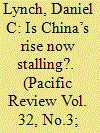

|
|
|
|
|
| Summary/Abstract |
The variations on power transition theory so widely used to frame analysis of U.S.–China relation tend to assume the inevitability or at least strong probability of China surpassing the United States in economic power if not necessarily military power. In the terminology of social psychology’s attribution theory, China is imputed with the identity of a state that is inevitably rising. The Chinese Communist Party encourages this attribution among Chinese people and foreigners. But China’s economic rise – the foundation of its comprehensive rise – appears to have entered an inflection point in the mid-2010s and may now be stalling. In critical respects, China increasingly resembles the last two countries that ‘attempted’ a globe-level rise: the unsuccessful cases of postwar Japan and the Soviet Union. China’s labor force is shrinking; the country relies excessively on unsustainable debt increases to fuel economic growth; and pollution is seriously harming public health. But even if China’s rise conclusively stalls, it may take quite some time before the Chinese public and outside observers recognize the new reality because of intrinsic biases in the cognitive logic of attributing identities to actors.
|
|
|
|
|
|
|
|
|
|
|
|
|
|
|
|
| 7 |
ID:
149517
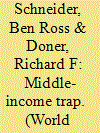

|
|
|
|
|
| Summary/Abstract |
Economists have identified the existence of a middle-income (MI) trap but have yet to analyze the politics of this trap. The authors argue that countries in the MI trap face two major institutional and political challenges. First, the policies necessary to upgrade productivity—as in human capital and innovation—require enormous investment in institutional capacity. Second, these institutional challenges come at a time when political capacity for building these institutions is weak, due primarily to the fragmentation of potential support coalitions. Politics are stalled in particular by fractured social groups, especially business and labor, and more generally by inequality. These conditions result in large measure from previous trajectories of growth. The empirical analysis concentrates on nine of the larger MI countries.
|
|
|
|
|
|
|
|
|
|
|
|
|
|
|
|
| 8 |
ID:
167579
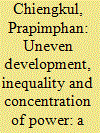

|
|
|
|
|
| Summary/Abstract |
This article provides a critique of the Thailand 4.0 strategy to push the country out of the middle-income trap through innovation-driven, inclusive and sustainable growth. First, it argues that the policies have insufficiently analysed the persistence of structural hierarchy and uneven development in the global political economy, which will constrain Thailand’s catch-up success in the future. Second, based on writings about progressive mission-led industrial strategies, it is argued that Thailand 4.0 ought to embed a progressive social and environmental agenda more clearly in its industrial strategy. Third, it is argued that Thailand 4.0 neglects to address the high concentration of political and economic power in the country, and also continues to allow unequal access to the policymaking process that has led to socio-environmental problems. Overall, this article argues that Thailand 4.0 will increasingly aggravate the two-tier fragmented nature of the political economic system of Thailand, where few can reap the biggest shares of the surplus and participate in more advanced sectors of the economy. It also calls for a more progressive industrial strategy and an alternative developmental path.
|
|
|
|
|
|
|
|
|
|
|
|
|
|
|
|
|
|
|
|
|